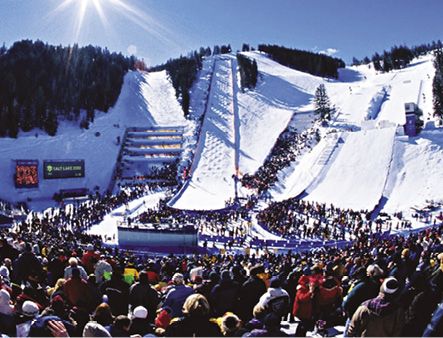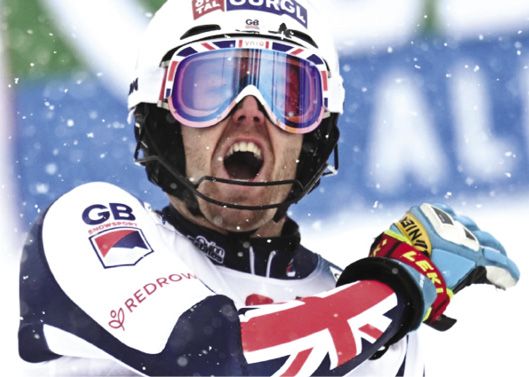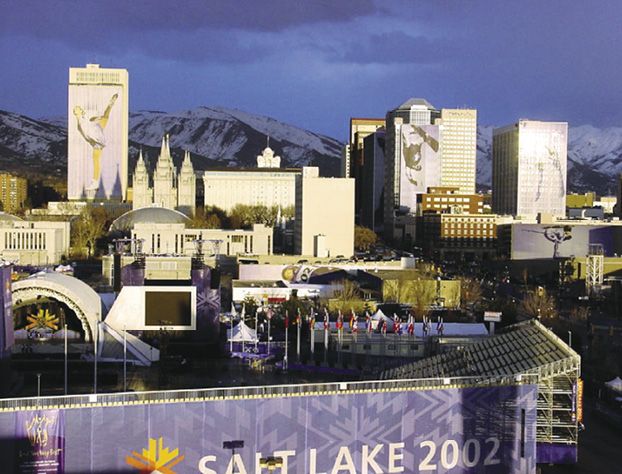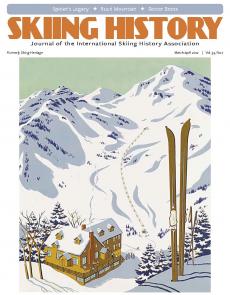SKIING HISTORY
Editor Seth Masia
Managing Editor Greg Ditrinco
Consulting Editor Cindy Hirschfeld
Art Director Edna Baker
Editorial Board
Seth Masia, Chairman
John Allen, Andy Bigford, John Caldwell, Jeremy Davis, Kirby Gilbert, Paul Hooge, Jeff Leich, Bob Soden, Ingrid Wicken
Founding Editors
Morten Lund, Glenn Parkinson
To preserve skiing history and to increase awareness of the sport’s heritage
ISHA Founder
Mason Beekley, 1927–2001
ISHA Board of Directors
Rick Moulton, Chairman
Seth Masia, President
Wini Jones, Vice President
Jeff Blumenfeld, Vice President
John McMurtry, Vice President
Bob Soden (Canada), Treasurer
Einar Sunde, Secretary
Richard Allen, Skip Beitzel, Michael Calderone, Dick Cutler, Ken Hugessen (Canada), David Ingemie, Joe Jay Jalbert, Henri Rivers, Charles Sanders, Christof Thöny (Austria), Ivan Wagner (Switzerland)
Presidential Circle
Christin Cooper, Billy Kidd, Jean-Claude Killy, Bode Miller, Doug Pfeiffer, Penny Pitou, Nancy Greene Raine
Executive Director
Janet White
janet@skiinghistory.org
Membership Services
Laurie Glover
(802) 375-1105
laurie@skiinghistory.org
Corporate Sponsorships
Peter Kirkpatrick
(541) 944-3095
peterk10950@gmail.com
Bimonthly journal and official publication of the International Skiing History Association (ISHA)
Partners: U.S. Ski and Snowboard Hall of Fame | Canadian Ski Museum and Hall of Fame
Alf Engen Ski Museum | North American Snowsports Journalists Association | Swiss Academic Ski Club
Skiing History (USPS No. 16-201, ISSN: 23293659) is published bimonthly by the International Skiing History Association, P.O. Box 1064, Manchester Center, VT 05255.
Periodicals postage paid at Manchester Center, VT and at additional mailing offices. Postmaster: Send address changes to ISHA, P.O. Box 1064, Manchester Center, VT 05255
ISHA is a 501(c)(3) public charity. EIN: 06-1347398
Written permission from the editor is required to reproduce, in any manner, the contents of Skiing History, either in full or in part.
Short Turns: Will the Winter Games Return to Salt Lake City?
A new and improved bidding process might give Utah the edge.
Salt Lake City, which hosted the Winter Olympics in 2002, has begun a bid process to bring back the Games as early as 2030, according to Susanne Lyons, chair of the United States Olympic and Paralympic Committee (USOPC).
“We are already in dialogue with the IOC–not yet for a specific year,” Lyons said at the USOPC’s press conference in Beijing, per Reuters press coverage. “Depending on what the needs of the overall Olympic movement are, that could happen as early as 2030 or it could happen after that.” Park City officials held a public meeting on February 15 to hear proposals from the Utah Olympic Legacy Foundation.
After criticism of its bidding process, the International Olympic Committee (IOC) is working to streamline the process. With costs soaring and public support waning, the IOC now prefers previous host cities with venues already in place. This gives Salt Lake an edge, Lyons indicated.

Vancouver, which hosted the 2010 Winter Games, has also expressed interest, as has 1972 host Sapporo. Public opinion in both cities appears split over proposed budgets around $2.5 billion. The Barcelona-Pyrenees region has also prepared a bid.
Host-city hesitance became evident with the 2024 Summer Games: Of five initial bids, only Paris and Los Angeles stuck it out. With no alternatives, the IOC gave Paris the 2024 event and L.A. got 2028. Only one city bid for the 2032 Summer Games: Brisbane, Australia got the IOC nod by default.
By the numbers, the 2022 Beijing Games hosted 2,900 athletes over 109 competitions. While reusing some venues from the 2008 Summer Games, Beijing still reported costs of $4 billion for Olympic-specific necessities. That doesn’t include new permanent infrastructure, such as the $9 billion high-speed rail line linking Beijing to the two Olympic-venue ski resorts. After the athletes leave, the high-speed train remains. Will tourist traffic make it pay? No one knows.
Approving 10-figure budgets is a tough sell these days for host cities, especially with reports of chronic corruption tainting the awarding process. Oslo, Norway, reported a 55 percent voter opposition to hosting the 2022 Winter Games, and pulled out of the bidding process.
In order to attract more host cities, the IOC no longer requires elaborate bid proposals costing millions of dollars. Instead of holding multiple votes to thin the candidates, the IOC now works to identify a “preferred bidder” and positions itself as a partner in the process.
IOC’s new focus on cities with existing venues appears to be working. The Paris 2024 Summer Olympics, per press reports, will be 95 percent staged in venues that already exist. More than 90 percent of the events for the 2026 Milan-Cortina Winter Games will be held at venues already in place.
As Lyons noted, the USOPC hopes that gives Salt Lake a leg up—both with the IOC and with the local community. “Salt Lake City has made it very clear to our partners at the IOC that they are ready and able to go as soon as we are needed,” Lyons said. –Greg Ditrinco
Dave Ryding, meet Mouse Cleaver
When, on January 22, Dave Ryding aced the Hahnenkamm slalom to become the first British skier to win a World Cup race, he joined an exclusive club. Ninety-one years ago, another Brit, Gordon “Mouse” Cleaver, won the very first Hahnenkamm combined trophy.

Cup victory, at age 35. ESPN photo
At the time (March, 1931), Austrian skiers were astonished that they’d been bested by an Englishman who wasn’t even a member of the British team (they assumed he hadn’t qualified, and that the “team” skiers must be even better.). That “team” consisted of members of the Kandahar and Downhill-Only Ski Clubs from Mürren and Wengen. Cleaver’s combined victory was based on finishing ninth in the downhill and second on a slalom course set by Bill Bracken, winner of the first-ever Lauberhorn slalom and combined held in February 1930.
No British subject topped a podium again in a premier race until Ryding’s victory. Konrad Bartelski came close, with a second-place finish in the 1981 Val Gardena downhill. The Scot Alain Baxter claimed bronze in slalom at the 2002 Salt Lake Olympics—only to have his medal revoked after a still-controversial drug test.
Mouse Cleaver joined the RAF in 1937 and became an ace, flying Hurricanes in France and in the Battle of Britain. In August 1940, his canopy was shattered by gunfire, sending plastic shards into his face and eyes. Near blind, he bailed out. He never flew again. While Cleaver lost the right eye entirely, and most of the sight in his left, an ophthalmologist noted that the plastic fragments didn’t inflame his eyes. This insight led to the invention of plastic lens implants. –Seth Masia
Snapshots in Time
1952 Heaven on Earth
When warm winds and spring sunshine put an end to skiing in the rest of the U.S., the season is just beginning at New Hampshire’s Tuckerman Ravine. Although there are none of the usual comforts available to skiers, such as warming huts and ski towns, Tuckerman skiers have other compensations. As the sun gets warmer in the valley, it turns the icy crust to crumbly “corn” snow, and skiing on “corn” is considered by fanatics as close to heaven as they will get on earth. — “Spring Skiing,” Life Magazine (March 10, 1952)
1968 Dial a Run
A new 24-hour telephone service for the latest ski reports is in operation. By dialing LY 4-7500 skiers can obtain information on snow conditions in the East, including New York, New Jersey, Vermont, New Hampshire and Massachusetts. The service is supported by the New York-New Jersey American Motors Dealers Association. — “24-Hour Phone Service Offers Latest Ski Reports” (New York Times, December 24, 1968)
1975 Biting Commentary
As a dentist living and practicing in a ski-oriented community, I treat hundreds of adolescents who are ski enthusiasts. For many years I have had SKI and Skiing magazines in my waiting room for my young patients to read. Your February article “The American Pros” is so electrifying with bar-room language, however, that I had to cut out most of the pages. — David R. Williams, Boulder, Colorado, “Take the Teeth Out of It” (Letters, SKI Magazine, September 1975)
1980 Redford’s One Run Too Many
I always make the mistake of skiing past what I should in terms of my fatigue. I’ll take a run right after the run that’s been so perfect, but the legs just won’t hold up and you won’t be quite as quick. Then you get mad so you go back and do it again to prove you can do it and you’re worse yet. —Robert Redford, “Who is that Guy?” (Powder Magazine,
November 1980)
1990 Easiest Way to Improve
Probably the single most common mistake skiers make is believing that their skis don’t need to be waxed. Properly waxing your skis is the easiest way to improve their performance on the slopes. New skis are normally iron waxed at the shop where they were purchased. If not, you can wax them at home. —Jim Deines, “Tuning Tips” (Skiing Magazine, February 1990)
1996 The Revolution Starts Now
Promises are cheap, but are they believable? Well, this time it’s true. The Shaped Ski Revolution is here and it will make skiing more fun. It’s a revolution that will free thousands of skiers from the drudgery of the skidded turn, and thousands more will ski longer, stronger and faster. —Jackson Hogen, “Revolution” (Snow Country, October 1996)
Table of Contents
WORLD CHAMPIONSHIP ($3,000+)
BerkshireEast/Catamount Mountain Resorts
Gorsuch
Warren and Laurie Miller
Sport Obermeyer
Polartec
CHAMPIONSHIP ($2,000)
Fairbank Group: Bromley, Cranmore, Jiminy Peak
Hickory & Tweed
Rossignol
Snowsports Merchandising Corporation
WORLD CUP ($1,000)
Aspen Skiing Company
Bogner of America
Boyne Resorts
Dale of Norway
Darn Tough Vermont
Dynastar/Lange/Look
Gordini USA Inc/Kombi LTD
Head Wintersports
Intuition Sports
Mammoth Mountain
Marker/Völkl USA
National Ski Areas Association
North Carolina Ski Areas Association
Outdoor Retailer
Ski Area Management
Ski Country Sports
Sports Specialists Ltd
Sugar Mountain
Sun Valley Resort
Vintage Ski World
World Cup Supply
GOLD MEDAL ($700)
Larson's Ski & Sports
Race Place/Beast Tuning Tools
The Ski Company (Rochester NY)
Thule
SILVER MEDAL ($500)
Alta Ski Area
Boden Architecture PLLC
Dalbello Sports
Deer Valley
EcoSign Mountain Resort Planners
Elan
Fera International
Holiday Valley Resort
Hotronic USA/Wintersteiger
Leki
Masterfit Enterprises
McWhorter Driscoll LLC
Metropolitan New York Ski Council
Mt. Bachelor
New Jersey Ski & Snowboard Council
Nils
Russell Mace Vacation Homes
SchoellerTextil
Scott Sports
Seirus Innovations
SeniorsSkiing.com
Ski Utah
Steamboat Ski & Resort Corp
Sundance Mountain Resort
Swiss Academic Ski Club
Tecnica Group USA
Timberline Lodge and Ski Area
Trapp Family Lodge
Western Winter Sports Reps Association
World Pro Ski Tour
Yellowstone Club


